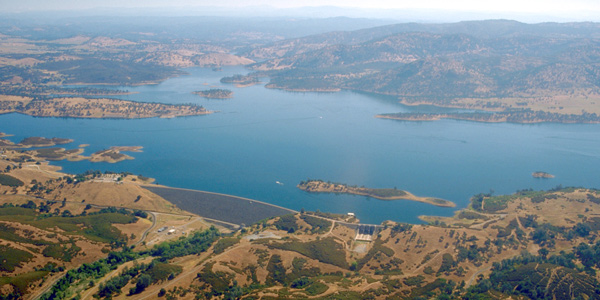By Hudson Sangree
FERC last week conditionally accepted CAISO’s Tariff revisions covering how it calculates opportunity cost adders for use-limited resources, such as small hydroelectric projects.
The commission had ordered CAISO to make the changes in June after finding the way the ISO calculated opportunity costs would produce varying results, instructing it “to address this ambiguity.”
“We find that CAISO’s proposed revisions … largely comply with the commission’s directives,” the commission wrote in its Nov. 19 order (ER18-1169).

The 3-MW New Hogan Dam in Calaveras County, Calif. Small hydro facilities such as Hogan are automatically classified by CAISO as use-limited resources. | U.S. Army Corps of Engineers
However, the commission agreed with NRG Energy’s protest that the RTO needed to specify the gas-price indices it would use to calculate the adders and instructed the ISO to submit another compliance filing within 30 days.
The changes FERC accepted last week were the latest in a series of revisions related to CAISO’s Commitment Costs Enhancements initiative. As part of that initiative, the ISO has tried to revamp the way it compensates resources that have limits on the number of start-ups and runtime hours, or on energy output, over a certain period.
CAISO has contended the changes are needed because of the increase in variable energy resources on its system, making supply more unpredictable and use-limited resources necessary at any given time.
Because the ISO’s market optimization software makes unit commitment decisions only one day ahead, it cannot consider that dispatching a use-limited resource may hinder its ability to run later. As a result, the resources’ opportunity costs are not reflected in their offers. CAISO sought to change that.
In June, FERC approved a CAISO proposal to allow use-limited resources to attach opportunity cost adders to their bids in its energy market. (See FERC Partially OKs CAISO Commitment Cost Enhancements.)
However, FERC agreed with NRG’s protest at that time that argued against CAISO’s method for calculating opportunity costs. It ordered the ISO to submit a compliance filing that provided more specificity on calculation methods.
The commission’s Nov. 19 order conditionally approved that compliance filing, with the exception of NRG’s most recent protest.



